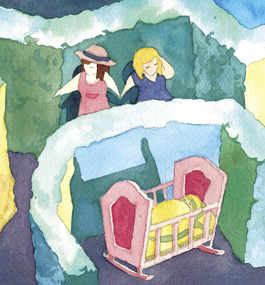Turning Points
Baby Love

Bailey Mariner
by Gail Shister ’74
It may be très chic now, but “lesbian motherhood” was an oxymoron when my wife and I decided to start a family in 1985.
In those days, artificial insemination was a rarity for lesbians, even in Philadelphia, City of Brotherly Love and Sisterly Affection. Yet we were used to being pioneers, having been married by a Reconstructionist rabbi in 1982. (We later divorced.)
For me in particular, breaking barriers was simply the cost of doing business. As one of the first women sportswriters as well as one of the first openly gay reporters, I had survived wars on two fronts — gender and sexual orientation. How tough could lesbian motherhood be?
As usual, my bravado was matched only by my naiveté.
Where would we get the sperm? Should we use an anonymous donor? What about the birth certificate — would we both be listed as the mother? Most important, where would we register for baby gifts?
About the only thing we did know was that I would be second chair for this, the most important trial of our lives. No issue there; I’m a pansy when it comes to pain.
For all the other questions — seen and unforeseen — there were no quick answers. We were in a situation without precedent. With no foremothers for guidance, we had to make it up as we went along.
The first challenge was finding the sperm. My wife was an OBGYN, so she had plenty of connections to fertility clinics in the city. In her professional life, however, she was in the closet, and coming out to her peers was not an option.
Moreover, some clinics would not serve an unmarried heterosexual woman, never mind a lesbian couple. In many cases, lesbians had to pretend they were straight to get the goods.
Eventually, we found a gay-friendly clinic. But before we could begin the inseminations, we had two more important decisions: Did we want to know the identity of our donor? And would we choose fresh or frozen? (Sperm, not yogurt.)
After consulting our attorney, we opted for anonymity. The last thing we wanted was some man showing up years down the road, claiming parental rights. No thanks, daddy-o. And we went with frozen sperm. Though less motile, it better fit our hectic schedules.
Our donor requirements were simple — a Jewish Ivy League graduate, able to leap tall buildings in a single bound. We perused profiles of numerous candidates, including one who said he was an Olympic swimmer. What better sign for a potential donor?
Over the first few cycles, we did the inseminations ourselves at home. It felt like an episode of “Seinfeld.” My wife calmly inserting the speculum into herself, then warming the pipette in her hands. Me, between her legs with a flashlight, searching for the opening to her cervix. “Dr. Livingstone, I presume?” I said, looking to add some levity to what was, to that point, merely a civil cervix exam.
After six unsuccessful cycles, we went the fresh route. This made for trickier scheduling. My wife had to be at the clinic within two hours of a collection, and she couldn’t always make it.
A few anxious cycles later, we learned that our little swimmers had reached the finish line. Score! We were ecstatic mothers-to-be.
Then came labor. My wife had warned me that OB-GYNs always have complications, and, of course, she was right. Without going into the gory details, it took three separate trips to the hospital before 8-pound, 4-ounce Elizabeth arrived via Caesarean section.
Since I could not legally adopt our baby girl, on the advice of our lawyer the birth certificate listed me as “father,” as proof that I had been in her life since her birth. (Years later, I was able to have both her mothers designated as “parents.”)
We held a naming ceremony, officiated by the same rabbi who married us. Inspired by our example, she and her wife soon gave birth to their own child, followed by another. We had started a trend. Now there are legions of “gaybies,” some with kids of their own.
Like any proud mom, I think my daughter is the world’s most spectacular offspring. After graduating in the top 10 of her class at Bryn Mawr, she is in the second year of a PhD program in psychology at the University of Virginia. Naturally, having grown up surrounded by neurotic lesbians, she wants to be a therapist.
When she was 7, she calmly informed me that, when she grew up, she intended to marry a man. I asked her why. She said, “Because I want to be different from all my parents.”
Different, yet the same. I wouldn’t have it any other way.
Gail Shister is a senior writing fellow at the University of Pennsylvania. Previously, she was a Philadelphia Inquirer columnist for 25 years.
